Are you looking for a delicious and healthy way to add sweetness to your breakfast or afternoon snack? If so, Greek yogurt may be the perfect choice. Greek yogurt is a rich source of protein, and it has all the thick, creamy mouthfeel that you’d expect from other types of yogurt. However, it also has a much tangier taste than regular yogurt.
If you’re looking for ways to enjoy sweetened Greek yogurt without compromising on nutrition, here are some tips and ideas that may help you out. With the right ingredients, you can make Greek yogurt much tastier without having to worry about all that sugar and extra calories!
What You Need
Greek yogurt is a delicious and nutritious snack but it can be a bit on the tart side. If you’re looking for a way to sweeten Greek yogurt without adding a ton of sugar, there are some great ingredients that can help you get your sweet fix without all the extra calories.
Let’s take a look at what you need.
Greek yogurt
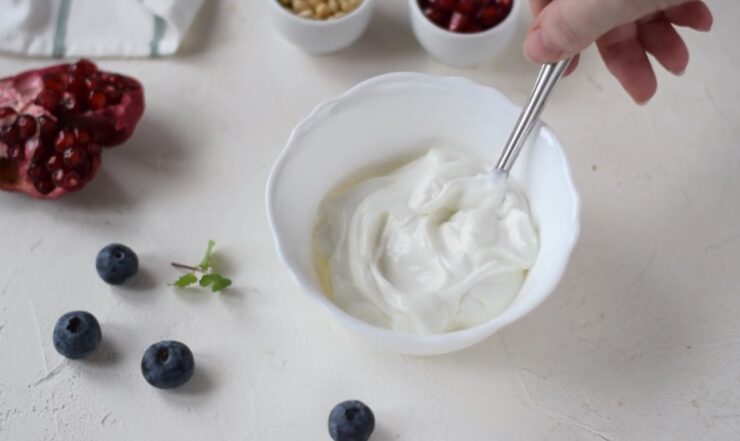
It is a thick, creamy product that is made from strained cow or sheep’s milk. It differs from traditional yogurts in that it has been strained to remove the whey (a liquid byproduct) three or more times. This makes it much thicker than regular yogurts and gives it a greater protein and probiotic content. It has become very popular in the last few years due to its thick texture and rich, tangy taste. However, it may need some additional sweetness for many consumers.
If you are looking to sweeten your plain Greek yogurt there are a few different methods you can use. All of these require adding outside ingredients in order to get the desired level of sweetness:
- Honey: A natural sweetener that you can stir into plain Greek yogurt for an instant burst of flavor without compromising its health benefits.
- Maple syrup: A less processed version of corn syrup or sugar but still offers plenty of sweetness that goes well with plain Greek yogurt’s tangy taste.
- Fruit: Adding fruit such as strawberries, raspberries, or blueberries to plain Greek yogurt not only adds sweetness but color as well!
- Cake batter powder: Certain cake batter powders are specifically created for the purpose of making smoothie bowls and other healthy yet sweet foods, like sweetened Greek yogurt!
These are just a few ideas on how to make your own perfect cup of either sweet or savory Greek Yogurt without putting extra calories into your diet!
Preparing the Greek Yogurt
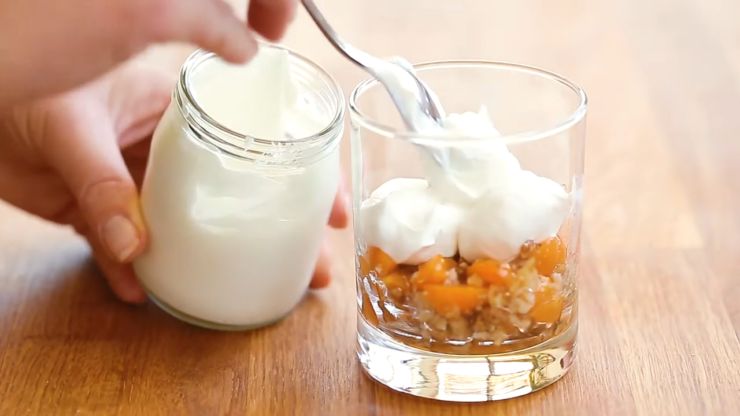
It is a great way to get a delicious and healthful breakfast or snack. It’s low in calories, high in protein, and packed full of probiotics. In order to sweeten it the right way, there are a few steps you can take.
Preparing it is the essential foundation for obtaining the optimal sweet flavor. Let’s get started with that process.
Choose the right yogurt
It has a thicker, creamier consistency and is packed with protein, probiotics, potassium, and other nutrients. It’s available in low-fat, whole milk, and nonfat varieties. Though not as widely available as regular yogurt, it is becoming increasingly popular due to its unique flavor and added health benefits.
When choosing your Greek yogurt to sweeten the right way consider factors such as fat content, sugar, ingredients, and add-ins such as fruit. Fat content affects the texture of the yogurt. Low-fat and non-fat yogurts are ideal if you are watching your calorie intake while still controlling blood sugar spikes as both low-fat options contain three times fewer calories than their whole milk counterparts.
The higher fat percentages in whole milk products also add creaminess for added flavor when selecting a base for your sweet treats. You should also check the labels for added sugars to limit or avoid additional sweeteners altogether. Go for those labeled ‘unsweetened’ or plain’, which contain lactose from milk but no added sugars or artificial sweeteners. This will ensure you get all of the nutritional benefits without any unwanted additives to your dessert dreams!

Sweeten the yogurt
While a popular and healthy snack, it can taste rather tart or bland. One way to sweeten the flavor of your yogurt is to add a natural sweetener like honey and mix it in completely. Choose one that has a mild flavor like clover honey. Depending on the sweetness of your honey, you can start with one to two tablespoons per cup of Greek yogurt, although some may prefer more or less.
To add a richer flavor and creamy texture to your yogurt, you can also try adding pureed fruit. Start by adding one-fourth cup of soft pureed fruit like bananas, applesauce, or peaches which will also add some natural sugars as they blend into the yogurt. Stir both the sweetener and pureed fruit until evenly distributed throughout the yogurt for a perfectly sweetened treat that’s hard not to love!
Sweetening Options
There are many different options when it comes to sweetening Greek yogurt. You can use fruits, honey, syrups, and even chocolate. Each of these options can help you get that sweet flavor you’re looking for in your Greek yogurt.
Let’s explore some of these sweetening options and how you can use them to get your sweet fix.
1. Honey

Honey is one of the most common ingredients used to sweeten yogurt. This natural sweetener is full of nutrients and is much healthier than sugar and other substitutes. Plus, honey has antibacterial properties, making it a great choice for promoting healthy digestion and overall wellness.
Honey is especially delicious when combined with Greek yogurt as well as fresh fruit, nuts, or cereal. To sweeten Greek yogurt with honey, start by stirring one tablespoon at a time into the yogurt until the desired sweetness is reached. You can also use clear honey if you don’t want to affect the color of your Greek yogurt!
2. Maple Syrup
If you’re looking to add both flavor and sweetness to your yogurt, maple syrup makes a great choice. As it is naturally processed and not refined like white sugar, this syrup contains loads of antioxidants as well as healthy minerals such as potassium and calcium. Moreover, depending on the grade, maple syrup contains up to 24 different kinds of antioxidants which are beneficial for your health in numerous ways.
Unlike most other sweeteners, maple syrup has multiple grades based on its color. Darker grades contain fewer calories, and more minerals and are usually less sweet than lighter-colored grades. Generally speaking, Grade A Maple Syrup is light in color with a mild flavor while Grade B is made from older sap and has a stronger taste.
For the best results when using maple syrup to sweeten Greek yogurt, start off with a small amount or dilute it with some water first before adding it in. This helps prevent the yogurt from becoming too cloying or sticky when cooled overnight in the refrigerator. Be sure not to add too much maple syrup though, since a heavy-handed approach could possibly ruin your delicious breakfast treat instead of elevating it!
3. Agave Syrup
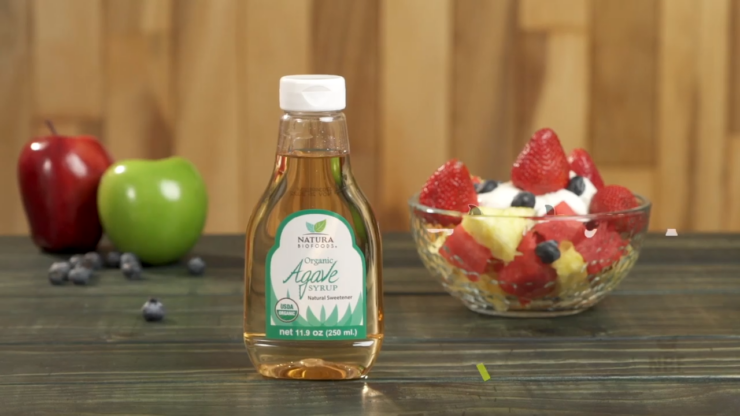
Agave syrup, also known as agave nectar, is a sweetener derived from the Mexican agave plant. Its flavors can range from light and mild to rich and dark. Light agave has a subtle sweetness with maple hints while dark agave tastes like caramelized sugar and molasses; both are intensely sweet. Although it contains calories like all other sugars, agave syrup is lower on the glycemic index compared to sugar and honey.
It’s easily incorporated into many dishes, such as smoothies or oatmeal or stirred into oat milk lattes, or added to yogurt or granola bowls. The recommended ratio of sweetener when using agave syrup is ¾ cup of agave syrup for every cup of granulated sugar called for in a recipe, as it is off-the-charts sweet!
Ready-made syrups are also available in store shelves that contain added flavors such as hibiscus and pumpkin spice – perfect for adding flavor to Greek yogurt.
4. Fruit
Fruits are some of the most traditional and easily accessed sweeteners for Greek yogurt. Easy to mix and match, fruits can be combined in ways to create a more dynamic flavor. Berries, such as blueberries and strawberries, can be added to any flavor of yogurt – these are also high in nutrients like vitamin C. Chopped and diced apples or oranges also work well with either flavored or unflavored Greek Yogurt. With fruits like apples and oranges, it is best to avoid the skins since they often harbor a bitter flavor.
Other options include dried apricots, raisins, pineapple, mangoes, papaya and peaches which make excellent toppings! Fresh pomegranate seeds are often used as decorations but they can impart a tartness that lends depth to denser Greek yogurt flavors – pomegranate molasses is an especially delicious choice!
5. Coconut Sugar
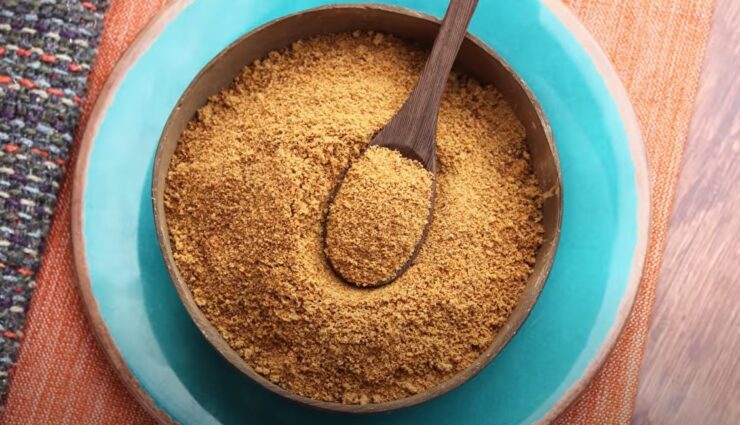
This type of sugar is made from the sap of cut flower buds of coconut palm trees and contains various minerals such as zinc, potassium, and magnesium making it healthier than traditional table sugar while having a negligible effect on blood glucose levels compared to white refined sugars hence allowing those with diabetes or those concerned with blood glucose levels an alternative form of sweets while not compromising on flavor!
Just remember that coconut sugar does not dissolve easily in liquids like water so test it out before adding large amounts into cold yogurts or smoothies else you risk ending up with unpleasant chunky bits at the bottom!
6. Stevia
A herb derived from plant leaves which – being natural – contain no calories whilst packing strong single digits sweetness which makes them an attractive option in terms of keeping calorie count low but also allows room for adjusting sweetness level much more easily compared to conventional methods (be careful not to go overboard though unless they absolutely require lesser sweetness levels). Additionally, they also have unrivaled shelf life allowing them last much longer than more conventional sources meaning there’s less wastage overall provided certain temperatures are maintained during storage/transportation phases along the journey before arriving at consumers’ fridges/cupboards!
7. Natural and Artificial Sugar
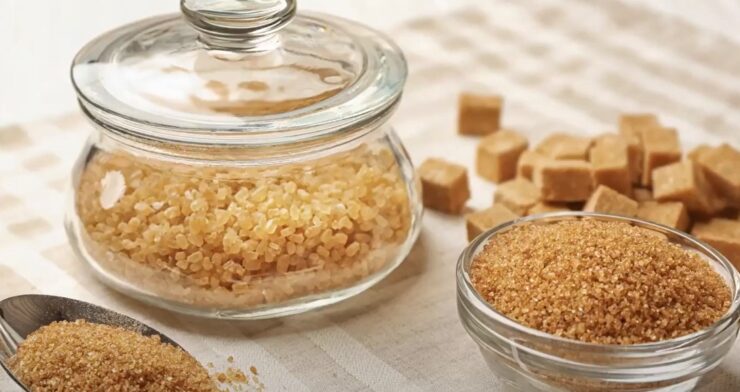
Natural sugars such as cane sugar or organic brown sugar work well in Greek yogurt because their delicate sweetness enhances the natural tartness without overpowering it. However, if you’re looking for a quicker fix with more intense sweetness then artificial sugars like sucralose or fructose might be better suited to satisfy your sweet tooth. Just be aware that they tend to add calories and lack nutritional value so if this is something that concerns you then you would be better off choosing one of the other options listed below.
Serving Suggestions
Although plain Greek yogurt is a great source of protein, sometimes it can be too tart for some people’s tastes. If you’re looking for an easy way to sweeten Greek yogurt, there are many delicious options.
In this section, we’ll discuss some serving suggestions that you can try to get your sweet fix.

Toppings
Adding toppings is a great way to sweeten Greek yogurt without overdoing it. Toppings can add flavor and crunch to a spoonful of yogurt and make it an entirely different experience. Here are some suggestions for healthy, delicious toppings that will help enhance the flavor of your yogurt:
- Granola or cereal: You can find many kinds of granola and cereal that are low in sugar but high in fiber and other nutrients—a perfect way to make plain Greek yogurt more exciting!
- Seeds: Seeds like chia, hemp, flaxseed, pumpkin, sunflower, and sesame can provide bite-sized protein boosts to it.
- Fruits: Add some sweetness naturally with fruits like blueberries, strawberries, raspberries, bananas, or any other favorite fruit.
- Nuts & nut butter: Almonds, walnuts, peanut butter, or almond butter add an extra boost of protein to Greek yogurt! Just be sure not to go overboard on the added sugar content.
- Veggies: Make things even healthier by adding fresh vegetables like cucumber slices or grated carrots to your bowl of Greek yogurt for a crunchier texture.
- Honey (or agave): If you want something a little sweeter than fruit or honey is what you should reach for—its natural sugars give just the right amount of sweetness – minus all the extra processed products!
Mix-ins
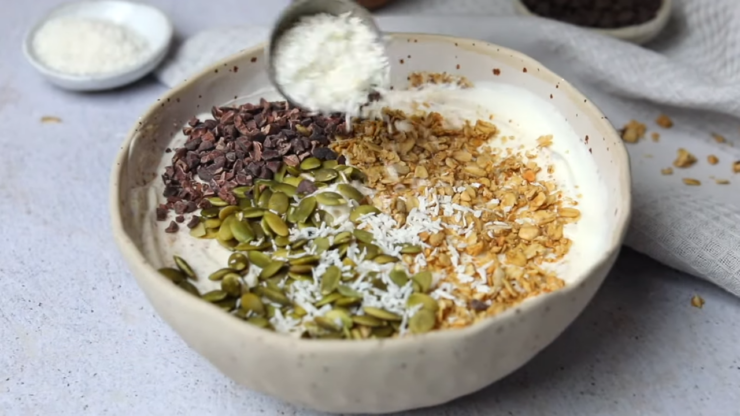
Mix-ins are a great way to sweeten it up without adding refined sugar. A variety of fresh or dried fruits, nuts, seeds and granola can serve as mix-ins, dramatically raising the sugar content of it without affecting its nutritional value.
For a sweetener that transitions better into the texture of yogurt than fruit chunks or crushed nut pieces, try purees or jams instead. Frozen goodies like dark cherries and dark berries are excellent options for making a flavorful puree — just be sure to thaw them first for better results. Of course, topping Greek yogurt with homemade jams and purees is also an option that lets you control the added sugar content.
For those who enjoy sweeter flavors, consider mix-ins like flavored syrups, honey or maple syrup. A tablespoon of either one should do the trick in adding flavor and sweetness, but all three should be used sparingly as these options are much higher in added sugars than fruit-based toppings. Other classic choices such as chocolate chips and coconut flakes can also be added to snack on unhealthy snacking habits — just remember to keep portion sizes in check!
FAQs

How much honey should I add to sweeten Greek yogurt?
It depends on your taste preference, but start with a teaspoon and adjust according to your liking.
Can I add fruit to sweeten Greek yogurt?
Yes, you can add fresh or frozen fruit like berries, bananas, or mangoes to sweeten it.
Can I use flavored yogurt to sweeten plain Greek yogurt?
Yes, you can mix it with flavored yogurt to sweeten it, but make sure to choose a low-sugar option.
Can I add jam or jelly to sweeten Greek yogurt?
Yes, you can add a small amount of jam or jelly to sweeten it, but choose a low-sugar option.
Can I use vanilla extract to sweeten Greek yogurt?
Yes, you can add a drop or two of vanilla extract to sweeten it, but make sure to choose a pure vanilla extract without added sugar.
Can I use flavored syrups to sweeten Greek yogurt?
Yes, you can use flavored syrups like chocolate or caramel to sweeten it, but make sure to choose a low-sugar option.
Can I use stevia to sweeten Greek yogurt?
Yes, you can use stevia to sweeten it, but make sure to use a small amount as it is much sweeter than sugar.
Conclusion
In conclusion, if you want to sweeten your Greek yogurt without feeling guilty, avoid processed sugars and look for natural, unrefined options. You can add maple syrup or honey, fresh or frozen fruits, nut butter and savory spices like cinnamon or cardamom to give the yogurt more flavor and sweetness. Look for ingredients like stevia or monk fruit if you want to reduce the amount of added sugar in your yogurt without compromising on taste.
Additionally, use dairy-free yogurts as alternatives to traditional dairy Greek yogurt for a vegan version of a classic sweet treat!

